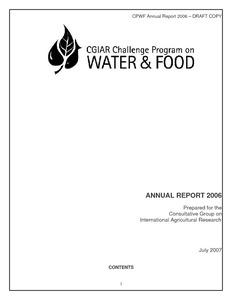Resource information
The CGIAR Challenge Program on Water and Food (CPWF) is a multi-institutional research for development program
that seeks to create and disseminate international public goods to improve the productivity of water in river basins in
ways that are pro-poor, gender equitable and environmentally sustainable. In doing so, CPWF contributes to efforts by
the global community to ensure that global diversions of water to agriculture are maintained at the level of the year
2000.
The specific objectives of the Program are to increase food production using less water, to improve livelihoods and
nutrition of the rural and peri-urban poor, to decrease water pollution from agriculture, to maintain water-related
ecosystems services and to reduce water-related diseases. To address these objectives, the program is structured into
five thematic areas: crop water productivity improvement; water and people in catchments; aquatic ecosystems and
fisheries; integrated basin water management; and the global and national water and food system. Research is
conducted in nine benchmark river basins, including the Andean system, Indus-Ganges, Karkheh, Limpopo, Mekong,
Nile, Sao Francisco, Volta and the Yellow.
Research in the Challenge Program is implemented through one of four focused research initiatives. First call projects,
selected through a competitive process, make up the greater part of the present CPWF research portfolio. Basin focal
projects add value to individual research project outputs by identifying in specific benchmark basins opportunities for
water-related interventions to achieve CPWF and partner development goals. Small grants for impact serve to remind
Program researchers of how their research should have practical outcomes for communities on the ground. Synthesis
research is essential to drawing together a large body of disparate and diverse information into a comprehensive whole.


